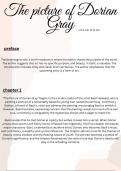The picture of Dorian
Gray – OSCAR WILDE
preface
The book begins with a brief introduction where the author shares the purpose of the novel.
The author suggests that art has no specific purpose, and beauty, in itself, is valuable. The
introduction includes witty and clever short sentences. The author emphasizes that the
upcoming story is a form of art.
chapter 1
"The Picture of Dorian Gray" begins in the London studio of the artist Basil Hallward, who is
painting a portrait of a remarkably beautiful young man named Dorian Gray. Lord Henry
Wotton, a friend of Basil's, visits and admires the painting, encouraging Basil to exhibit it.
However, Basil hesitates, expressing concern that the painting reveals too much of his own
soul. Lord Henry is intrigued by the mysterious Dorian and is eager to meet him.
Basil reveals that he met Dorian at a party but wishes to keep him a secret. When Dorian
arrives, Basil warns Lord Henry not to influence him negatively. The first chapter introduces
major characters: Basil, a talented but secretive artist; Dorian, who becomes Basil's muse;
and Lord Henry, a wealthy and cynical influencer. The chapter sets the tone for the themes of
beauty versus intellect and the fleeting nature of youth. The portrait becomes a symbol of
Dorian's significance, and the chapter foreshadows the central role that Dorian's beauty will
play in the unfolding narrative.
, chapter 2
In Chapter 2 of "The Picture of Dorian Gray," Lord Henry meets Dorian Gray and immediately
compliments his extraordinary physical beauty and youthful innocence. Despite Basil's
desire to continue painting, Dorian insists that Lord Henry stays, and they go into the garden
where Lord Henry subtly begins to influence Dorian.
As their acquaintance develops, Dorian becomes captivated by the reflection of his own
beauty in the portrait. However, he becomes disturbed when Lord Henry suggests that his
beauty is fleeting and will diminish with age. In a moment of vulnerability, Dorian expresses a
fervent desire to remain eternally young and beautiful, even willing to trade his soul for it.
Lord Henry invites Dorian and Basil to the theatre, and when he offers Dorian a ride in his
carriage, Basil protests, choosing to stay with the portrait. Basil trusts Lord Henry not to
further influence Dorian negatively, but Lord Henry playfully remarks that he wishes he could
trust himself.
Chapter 2 is crucial as it introduces Dorian's physical attractiveness and highlights his
immature and easily manipulated nature. The Faustian theme, where Dorian expresses a
willingness to trade his soul for eternal beauty, becomes a pivotal aspect of the narrative,
adding a layer of moral complexity to the story.
chapter 3
In this chapter, Lord Henry pays a visit to his uncle, Lord Fermor, to gather more information
about Dorian Gray's background. The following day, Lord Henry and Dorian have lunch
together and leave as companions.
The primary purpose of this chapter is to provide insights into Dorian's family history,
revealing a troubled past that contributes to Dorian's character as a complex and romantic
figure. The relationship between Lord Henry and Dorian deepens, with Lord Henry openly
expressing his intention to exert influence over Dorian. He compares his impact on Dorian to
that of a sculptor shaping a statue out of marble, suggesting a sense of control and
manipulation. Lord Henry's motives toward Dorian become clearer, indicating a growing
power dynamic between them.





